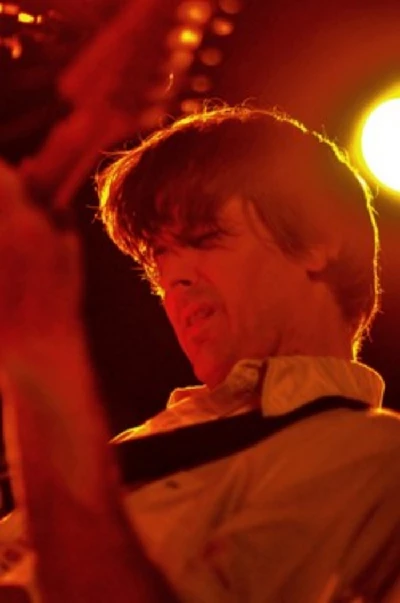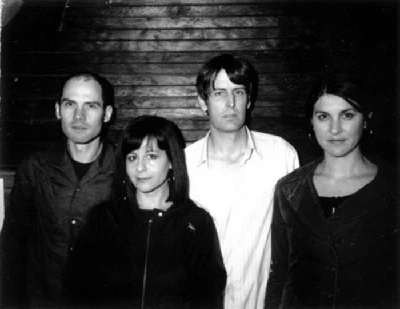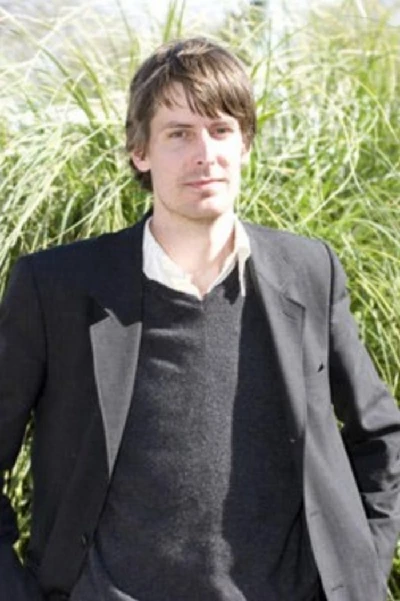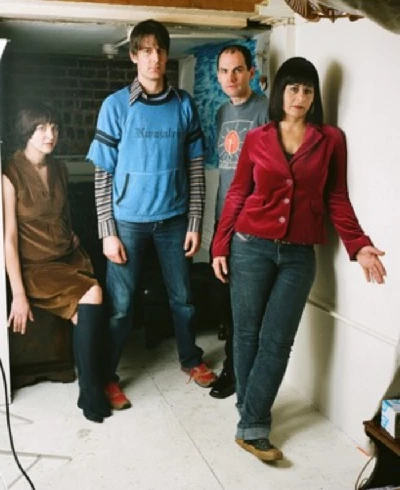published: 20 /
6 /
2008
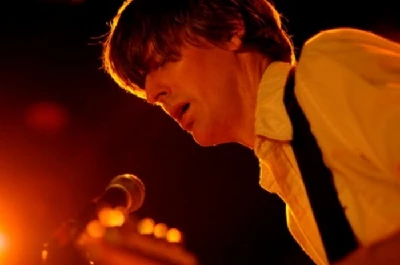
Mark Rowland speaks to former Pavement front man Stephen Malkmus the night after playing a show to a packed audience in London about both his latest band the Jicks and their recently released compplex latest album, 'Real Emotional Trash'
Article
Life after playing in a seminal band can be difficult. Continuing your career in music can be forever tainted by critics' comparisons of your new album with the albums you made a long time ago with a different group of people. It takes some determination to break free of that and not everyone can - many a solo career has ground to a halt when the artist in question (and the fans and critics) realise that they weren't the only talented one after all.
Almost ten years on from Pavement's split at the very end of the 90's, Stephen Malkmus has so far managed to avoid this trap, ploughing a neat furrow in US indie rock that allows him to follow his stylistic whims while keeping the fans on side. Although the sound of his new band the Jicks' is distinctly different to that of Pavement, Malkmus' voice and guitar playing is unique enough that he has kept most Pavement fans on side. Flipping between concise, quirky indie pop songs and folk/rock/prog jams, the band's fans are almost divided by their favourite records, each of which tends to favour one of those styles.
Their latest album, 'Real Emotional Trash', falls neatly in the latter category - a beefier record than its predecessor, 'Face the Truth', thanks in part to the drumming contributions of Janet Weiss (Sleater Kinney, Quasi). A slow burner, the complexity of the songs bear up well on repeated listening, and, despite several long songs with extended instrumental sections, the album is still very strong melodically and Malkmus' usual traits and quirks are present.
It is when you see the songs live, however, that you realise that they were written for the stage. Playing to a packed Shepherd's Bush Empire a few weeks ago, the Jicks (completed by bassist Joanna bolme and guitarist/keyboard player Mike Clark) rocked the house, playing the new album in its entirety over the course of the set, with several from previous albums scattered in between. Malkmus was an engaging frontman, joking with the crowd throughout the set about breaking his tooth on a kebab before coming on stage. It is difficult to tell if he is telling the truth or not, but at the end of the day, it's all in the name of entertainment.
We caught up with him the next day on the phone to his hotel room in central London. Malkmus sounds a little dazed on the phone, yawning as he answers and answering every question in a slow, cracked drawl. Initially, we assume we have woken him up, but we are graciously allowed to continue the conversation
PB : You played a good show last night.
SM : Thanks a lot. I had a good time. Thanks for the compliment.
PB : Did you actually chip your tooth before the show ?
SM : No, I didn't chip it, but to me it sounded more ridiculous to break my tooth on a kebab, but what happened was I ate a really hot piece of chicken in this restaurant around the corner and it just set my tooth off. It hurt. Everything that was hurting that I ate or drank. Perhaps it brought my filling loose, but it was very painful.
PB : Perhaps you channelled that pain into your performance.
SM : I tried to make light of it by saying that in medieval times all the toothaches might have led the warriors to have more bile and more hate to kick ass. I was running different forms of energy though last night, really trying to carry through on an arduous few days that we had done. It was a nice way to end five shows in a row.
PB : Have you had a chance to visit anywhere in London while you've been staying here ?
SM : I've been here so many times that there's not much that I want to do except go out to eat, just rest and maybe do laundry. I slept until twelve today, so I'm not gonna make a huge effort to get out. It's nice just to relax in a decent hotel, just be comfortable. I'm sure that's what most super famous people do. They sit there in a five star hotel and just be famous behind doors.
PB : Aren't you supposed to be trashing it? That's the traditional pastime of the stars isn't it?
SM : Well, yeah maybe. I'm thinking more like Hollywood people. Bands, what do they do ? I don't know what they're doing these days. Not trashing televisions. I think they're just getting a bit drunk and hoping to date somebody that's better looking than them or something. 'Date' with quotations.
PB : I'd like to ask you about your new album. It sounds more muscular than the previous records. Is it more of a band collaboration ?
SM : It's just a product of the other members' instruments, how they like it to sound and what they're into. The way it was recorded and how we play together. I guess that all comes together as a piece, how that makes it sound how it sounds. It's hard for me to think back through all the times that I've done music, the different ways of doing things and how that affects the record, but, yeah, we were pretty much playing live in the room, with everyone's instruments how they wanted them, and not too much bossing around.
PB : How much input do the band have in the songwriting process ? Do you bring the finished songs with you when you go to the studio ?
SM : I bring the skeletons, the demos, I make demos. They're not demos in the way that Johnny Marr would consider a demo or something, where all the parts are there. I do a little bit of bass, some vocals which might not end up like the finished vocals, to give everyone an idea of the tone and tempo. Then things kind of mutate a bit. Maybe some improvised bits are added to it, but it starts that way. I find that's the best way to approach it. It's kind of hard to bring something to people with no clue and with this kind of music, if there's no way to listen to it. You could spend three days in practice trying to explain some of the things. But if you're doing like Replacements songs, you could probably say "it goes a bit like this" then the bass player will add his thing and pretty soon you're rockin'.
PB : You have a distinctive guitar playing style. How do you think it's developed and changed over the years ?
SM : Well, you know I'm still in a similar field. Some things I got tired of, from seeing a lot of gigs and playing gigs. Some ways of playing, just kind of hitting the distortion pedal and playing all the chords at once, that wore out on me through grunge. So I guess I listen a little more to what I'm doing. I could always play pretty fast from the Pavement days. There was a lot of that inhereted from Sonic Youth, the tension that comes from playing two strings on the same note really fast. That represented rocking, or something, in an avant garde way. Back then I'd just use a rat pedal and a Fender Twin or whatever they gave me, and that was it.
I'm probably a little more aware of the tone of the guitar - well I was always aware of the tone - but more able to control some of the range and hit the strings more precisely. By being able to do that, things sound a little more clear. Going along with that, I've also made songs that have space for melodic improvisation. It could either go in a Television style melodic jam way or it could be broken up or there's blues scales and jagged parts or whatever. I'm more interested in that. It's all in the spur of the moment really, maybe it takes a bit of time and confidence to play songs like that. Three or four of the songs have parts where it's different every night. Maybe most bands don't do that.
PB : Your lyrics are also quite unique. What inspires you lyrically ?
SM : I don't know, it's all intuition. Of course there's sort of a source of everything, the bands I like, these Neil Young style lyrics that don't mean anything but mean a lot, or Mark E Smith, or even Jim Morrison or something stupid like that. There's sort of a river of influence that I swim in. REM maybe, I don't know. You don't even have to name one, Wire or something, a certain kind of band. I feel like should be there, fitting in with those bands, I don't think about it when I'm writing, but that's where I'm at, unless it's a different sort of song.
So I sort of take a subconscious jury of these kind of things. I think that's probably always there as an editor. Then besides that, I just look into myself and what is there, what I'm comfortable writing about and what comes out randomly that I can build upon. That's how I do it. To nail it down more, it's just like your taste is there and then there's some just natural influence of whoever you are or whoever I am and after that there's just some polishing or work. That's what it is. There's not much more to it than that.
PB : Your lyrical style seems to have become less abstract over time. What's changed ?
SM : Well I guess back in the day it was a little more tossed off, I thought that was kind of cool. It was part of the Pavement game and it turned out it was pretty cool to the people who liked it, but it could have been bad. It wasn't, but you know maybe it could have been. But the song structures just aren't like that anymore. They're sometimes more serpentine, although some aren't. I don't know. I think it's just growing up, changing. It's a natural progression. It's still in the same ball park, but it's been like, 17 years. It's hard to believe it's been that long since I started doing the Pavement stuff. It's quite a long time, so it's bound to change.
PB : All of your albums have their own distinctive sound. To what extent is that planned ?
SM : As much as it can be without bringing in Dangermouse to fuck shit up. We don't do that, although I'm not saying people shouldn't do that, but the idea for me is to use these certain restrictions which is always good with this kind of music. It's different if there's some outside influence. Like, my version of bringing Dangermouse in to fuck shit up is to go to different studios I've never been to, work with different engineers and mixers that aren't some name that will make the 'NME' put you further up in their random notes. Just work with unknown people that make different sounds and try to use different instruments. Those are our... I don't know what you'd call them, just outside things.
Other than that, usually I really only think back to the album before the one I'm working on and think about how it should be different from that one sonically. Maybe like different song styles. I just bounce back and forth. It's not necessarily consciously that way. It's usually just figuring out what I didn't like about something on the last record and trying something different instead. It's all within the same mind and the same songwriter so it's not like we're going hip hop, then working on a computer and then with an orchestra with a lot of reverb. You could do that, if your only goal was just to be different. I could take it further in that direction, but we want to keep it within the confines of who we are and where we're strong, you know and where no-one else is.
That's our space, then we try to fuck with it by using different producers, stuff like that, to keep it interesting.
PB : A collaboration between you and Dangermouse might work well. I'd probably buy it.
SM : It could be a good thing. You never know. I think the guy's really talented, don't get me wrong, but thus far, although I did a record with Nigel (Godrich, producer-MR) from Radiohead, I've always liked using these unknown people, you know, the soldiers out there that are under-appreciated. There are a lot of great guys out there that aren't getting the recognition they deserve.
PB : You should work with Liam Watson at the Toerag studios in London.
SM : I know, I've heard about him. I've heard that place is great. Domino uses that place a lot. One of their bands was the first band to work there before the White Stripes. Laurence (Bell, Domino Records founder-MR) is all over it. He's got his ear relatively to the ground. He's not in the squats, finding the really weird music that's probably being made in London, but he seems to know a lot of stuff.
PB : A lot of bands from my home town, Chatham, have recorded there.
SM : Chatham, is that in Kent, or is that different?
PB : It's in Kent, yes.
SM : A girl I know who goes out with one of the Archie Bronson Outfit guys. She's a publicist. She was telling me all about it. It sounds like a little slice of England, you know, big jewellery and stuff. I can only imagine really.
PB : Best just to keep imagining it. Moving on, you were employed as the singing voice for Cate Blanchett in the Bob Dylan film, 'I'm Not There'. How did you get involved with that ?
SM : Well, the director (Todd Haynes-MR), he lives in my town when he's not jet setting around being a world famous director. I know him a bit, so probably as he compiled it he probably thought of me. There's a lot of usual suspects on there, kind of American indie, almost successful bands. I should be able to do Dylan as well as anybody else on there, I have as much in common with Dylan as any of the other guys, so.
PB : Was it weird to see your voice emanating from Cate Blanchett in the film ?
SM - No doubt, but it's you know, I mean.. I don't know. She's a famous actress, but it kind of blows by, that bit of it. I was just sort of bewildered, but the whole movie's bewildering. You're just a small part of like a whole bunch of weird stuff 's such an ensemble, so many contributors. So it's Altman-esque in that way, which I definitely think is Todd Haynes' thing. The scope of it is kind of like that.
PB - Would you ever score a soundtrack yourself?
SM - I would try it. Some people seem more suited to it, like the Spacemen 3 guy did Harmony Korine's movie, 'Mister Lonely'. I mean the Spiritualized guy, Jason Pierce. You could see him doing that. He seems like he'd just be happy getting a string section and locking himself away and do it. I would definitely consider it if it was something cool. Anything you could get lost in, any musical thing, that's probably the best thing for me.
You might get lost in the music for maybe 20 minutes of a concert, you know, when you're not worried you're not playing it right or trying to sing it correctly. So that's like 20 minutes a day. The rest is just travelling around and not trying to be bummed out. If you were doing a score I reckon it would be pretty great. I'm sure after about 12 soundtracks it would get boring but if it's a new thing, yeah.
PB : Radiohead's guitarist recently did the socre of 'There Will Be Blood'.
SM : Johnny (Greenwood) yeah, he did a good job. They get all the musical guys to do it. Funny that, how they get the musical ones to make the soundtracks. They should get Morrisey to do a score for a movie. That would be funny. Just see what he would come up with.
PB : It would probably have to be set in Manchester, I think.
SM : Or maybe Spain. Half of Manchester lives there now anyway.
PB : What kind of film would you want to score?
SM : Just you know, it doesn't really matter to me as long as it was an incredible director, somebody so cool that I don't even know who they are. That's all I really care about. It doesn't matter what the subject matter would be. I could do anything. Alhough I probably wouldn't be able to do 'Titanic' or anything like that.
PB : You'd probably do a better job than Celine Dion
SM : (Laughs) I don't know, I don't think I could carry that. You need the Coldplays of the world to make the 'Titanic' soundtracks.
PB : You could have done Indiana Jones. You could have done Cate Blanchett's singing voice for that as well.
SM : Oh man, that movie wasn't so good. It was disappointing. I saw it in Paris the other day. It was either that or 'Sex and the City', those were the two English movies playing and my manhood said that I can't go to see 'Sex and the City', but I probably would've had a better time in there.
PB : What didn't you like about it?
SM : I didn't know it was going to be just so, so corny throughout the whole movie, the bad chase scenes and stuff. Really, really disappointing. Maybe if I was 11 I would have enjoyed it more.
PB : I thought they could have made more of his age, rather than have him jump about all over the place without really getting tired at all.
SM : I know, it's true. They tried to make light of his age a bit with some of the jokes, but not in the way he was acting when he was being a super hero, you're right. They should at least have had a couple more jokes about it or something. Good point. I actually fell asleep during one of the car chases, somewhere in the jungle. I woke up when they were monkey jumping.
PB : That bit wasn't good.
SM : I know. Speilberg, I know he's got talent but...I don't know. Next question.
PB : Now that you're a family man, has it changed the way you work at all?
SM : Not like in any primordial way. It's kind of like...now I have two of them, I still haven't had a chance to get in there and figure out what I'm going to do next. It's still going to be rock'n'roll. I don't know if it will open me up or shut me down lyrically. Even if it opens me up or shuts me down, I still think it will be something pretty good, I hope. It will just be more repressed, or just cool words that don't mean anything. I don't know, you know.
But the music still exists in its own world of just cool records, the future and the physicality of actually playing. I'm not going to get all dadded out or anything like that. I just don't really like that sort of music. I like some soft pop and stuff, but my voice doesn't really go with that kind of music and I'm more into shredding a little bit. But we might have some more catchy songs next time around, we'll see. Less rock, less physical songs, I don't know.
PB : You could write more songs that reference Sesame Street characters
We only have just the one at the moment ('Elmo Delmo' from 'Real Emotional Trash'). Like I said on stage, I saw this lady wearing this vintage Elmo shirt yesterday. She was like this 35 year old sexy woman that you don't normally see wearing clothes like that. She was walking around Shepherd's Bush and I was like "Alright". I always thought Elmo Delmo was a really stupid thing to sing, but I just kept it in there as it didn't really matter as it was just like a chant. I was like "That lady's wearing that, she thinks it's cool." She was like a cool chick, you know, so Elmo's alright.
PB : There's currently a clip on Youtube of Elmo and Robert De Niro sitting next to each other and someone has dubbed the dialogue from a scene in 'Casino' over the top. It's very cleverly done.
SM : Sometimes I go on Youtube and look at these My Little Pony things. There's this really cheesy thing called My Little Pony. It's like this world of pink ponies that eat ice cream and ice skate and have lots of fun. Anyway, there are all these like people that alter them and make them all like dirty or weird a little bit. Sometimes I'll be at the house and my kid will want to watch something and I'll be doing something, so I'll put My Little Pony on for her to watch and I'll be like "Oh no, not that fucking pornographic My Little Pony." I have to be really careful to make sure she doesn't see anything dirty. But I'm sure the Elmo thing is more tastefully done.
PB : Thank you.
Band Links:-
https://www.facebook.com/pages/Stephen
http://stephenmalkmus.com/
https://twitter.com/malkmusandjicks
http://stephenmalkmusandthejicksblog.t
Picture Gallery:-
